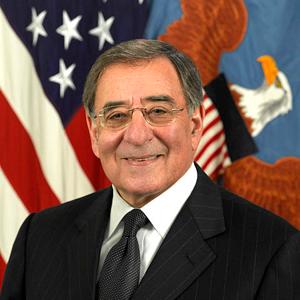Pakistan Troubled By US Remarks About Bin Laden Capture
Defense Secretary Leon Panetta Has Appealed to Pakistan to Release Shakil Afridi (Photo: Defense Dept)
Defense Secretary Leon Panetta’s latest remarks about Pakistan aren’t going down well in the south Asian country.
In a “60 Minutes” interview broadcast by CBS Sunday, Panetta reiterated that someone in the Pakistani government must have known where Osama bin Laden was hiding.
The Pentagon chief also admitted that a Pakistani doctor helped the CIA find bin Laden’s compound last year.
And he expressed concern about the doctor, who’s been arrested by Pakistani officials and charged with treason.
Leon Panetta was in charge of the CIA when Navy Seals staged their dramatic raid inside Pakistan, killing bin Laden.
Weeks later, a Pakistani doctor, Shakeel Afridi, was arrested.
Afridi may yet face treason charges after being accused of running a fake vaccination program as a way to gain access to bin Laden’s compound for the CIA. Panetta told “60 Minutes” he’s worried about how Afridi is being treated.
“This was an individual who in fact helped provide intelligence that was very helpful with regards to this operation,” Panetta said. “He was not in any way treasonous towards Pakistan, he was not in any way doing anything that would have undermined Pakistan. As a matter of fact Pakistan and the United States have a common cause here against terrorism. And for them to take this kind of action against someone who was helping to go after terrorism, I just think, it was a real mistake on their part.”
Pakistan was embarrassed by the raid and accused the US of violating its sovereignty.
Back then, anti-American sentiment was running high — one Gallup poll suggested 85 percent of Pakistanis disapproved of US leadership. It wasn’t always like that.
“I have been to America when I was a young officer. I did one of the training courses there and that was the F-16. I have some very fond memories of the people I interacted with,” said Retired Pakistani Air Force Marshall Shahad Latif.
Latif remembered the good old days when he worked side by side with American pilots, learning to fly US made warplanes. But Latif said all those years of teamwork doesn’t give Panetta a right to criticize Pakistan for how it treats Afridi — someone who Latif believes must face consequences for working for the CIA.
“What are Americans to think in a situation like this where a man who apparently helped the world get rid, helped the world get rid of Osama bin Laden is being held and accused of being a traitor in this country?” I asked him.
“This is a difficult proposition that you put up. But apparently the fact he passed information I think he does come in the bracket of a traitor,” Latif said.
Political analyst Imitaz Gul takes a similarly hard line. It doesn’t matter to Gul that Afridi’s apparent target was bin Laden — it matters that he was passing secrets to the US and withholding them from Pakistani authorities.
“You know, it’s really easy to argue against it or argue for it. But it depends who is arguing it. The Americans probably think they can probably get away with everything,” Gul said.
Gul knows American officials have lost faith in Pakistani intelligence — believing they actively cooperate with sections of the Taliban in Afghanistan. And in the “60 Minutes” interview, Panetta said that while he had no evidence, he believed that someone in the Pakistani government knew bin Laden was hiding in their country.
So, plenty of bad feelings on both sides, said Gul. And not made any better by a November cross border clash with US troops that left 24 Pakistani soldiers dead.
“These relations continue to suffer from mistrust. So as long as this perception stays, I think there will be enough reason for the Americans to be wary or suspicious of the Pakistani establishment and the Pakistani establishment on its part is suspicious of the American long term planning,” Gul said.
There have been some attempts to repair relations. US drones are reportedly flying over northern Pakistan again. And the parliament in Islamabad seems poised to reopen the border crossings for NATO supplies that were closed by Pakistan in an act of retaliation.
Still, the resentment toward America doesn’t appear to be dissipating. And that probably means the Pakistani doctor who helped the CIA bag bin Laden shouldn’t expect to get off lightly in his own country.
Every day, reporters and producers at The World are hard at work bringing you human-centered news from across the globe. But we can’t do it without you. We need your support to ensure we can continue this work for another year.
Make a gift today, and you’ll help us unlock a matching gift of $67,000!
